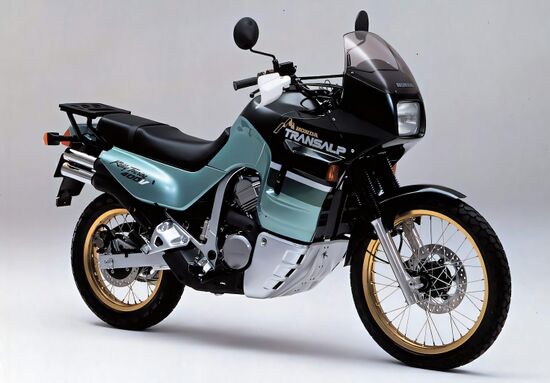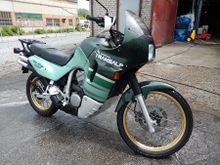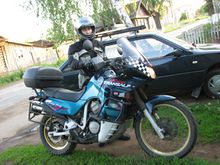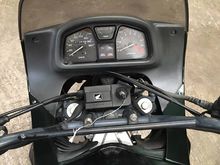Difference between revisions of "Honda XL400V Transalp"
m |
m |
||
| Line 1: | Line 1: | ||
| − | {{DISPLAYTITLE:Honda XL400V Transalp | + | {{DISPLAYTITLE: Honda XL400V Transalp}} |
| − | |||
| − | |||
| − | |||
| − | }} | ||
__notoc__ | __notoc__ | ||
| − | [[File:Xl400v_mod1.jpg|center|550px]] | + | [[File: Xl400v_mod1.jpg | center | 550px]] |
| − | + | The Honda XL 400 V Transalp touring enduro model appeared on the market in 1991 and was targeted at the Japanese market. The model is based on the older export version [[Honda_XL600V_Transalp | Honda XL 600 V Transalp]] of the second generation (XL600Vn), differing from it in the engine, gearbox ratio and other insignificant parameters. In general, both motorcycles are almost identical in appearance. | |
{{Ads_top}} | {{Ads_top}} | ||
| − | + | The basis of the Honda Transalp 400 was a 2-cylinder V-shaped liquid-cooled engine with a volume of 398 cubic meters. cm, delivering 37 hp. power and 34 Nm of torque. Maximum motor characteristics at 6500-8500 rpm. This engine was also installed on models [[Honda_Bros_400 | Honda Bros 400]], [[Honda_VRX400_Roadster | Honda VRX 400]], [[Honda_Steed_400 | Honda Steed 400]], [[Honda_Shadow_400 | Honda Shadow 400]]. | |
| − | + | Among the features of the model, a steel frame, disc brakes, long-travel suspensions, high ground clearance, an 18-liter fuel tank and 201 kg of curb weight should be distinguished. | |
| − | + | In 1994, the Honda XL400V Transalp, as well as the Honda XL600V Transalp, underwent a slight restyling, receiving a new headlight and a modified fairing shape. | |
| − | 1996 | + | 1996 was the last year of production of the Honda XL 400V Transalp, after which the model rolled off the assembly line and did not receive further development. The export version XL 600V was on the market until 2000, after which it was replaced by [[Honda_XL650V_Transalp | Honda XL650V Transalp]]. |
| − | + | Despite the rather weak dynamic characteristics due to the low-volume motor, the model is quite popular in Russia. And there are a number of reasons for this. Firstly, the Honda XL400V Transalp is well represented at Japanese auctions. Secondly, the model is cheap, which makes it available to a wide range of buyers. Thirdly, versatility, simplicity and reliability make the motorcycle optimal for use in Russian conditions. | |
| − | '' | + | '' The lineup of the Honda Transalp series: '' |
* '''Honda XL400V Transalp''' | * '''Honda XL400V Transalp''' | ||
| − | * [[Honda_XL600V_Transalp|Honda XL600V Transalp]] | + | * [[Honda_XL600V_Transalp | Honda XL600V Transalp]] |
| − | * [[Honda_XL650V_Transalp|Honda XL650V Transalp]] | + | * [[Honda_XL650V_Transalp | Honda XL650V Transalp]] |
| − | * [[Honda_XL700V_Transalp|Honda XL700V Transalp]] | + | * [[Honda_XL700V_Transalp | Honda XL700V Transalp]] |
| − | '' | + | '' The main competitors of the Honda XL400V Transalp in the class: '' |
| − | * [[Kawasaki_KLE400|Kawasaki KLE400]] | + | * [[Kawasaki_KLE400 | Kawasaki KLE400]] |
| − | == | + | == Photos == |
| − | {| align="center" border="0" | + | {| align = "center" border = "0" |
| − | |[[Image:247231-tm1372832850.jpg|220px|thumb|right|Honda Transalp 400]] | + | | [[Image: 247231-tm1372832850.jpg | 220px | thumb | right | Honda Transalp 400]] |
| − | |[[Image:6287490.jpg|220px|thumb|right|Honda Transalp 400)]] | + | | [[Image: 6287490.jpg | 220px | thumb | right | Honda Transalp 400)]] |
| − | |[[Image:1505704187439 bulletin.jpg|220px|thumb|right|Honda Transalp 400]] | + | | [[Image: 1505704187439 bulletin.jpg | 220px | thumb | right | Honda Transalp 400]] |
|- | |- | ||
|} | |} | ||
| Line 37: | Line 33: | ||
{{Ads_post}} | {{Ads_post}} | ||
| − | == | + | == Specifications == |
| − | + | Specifications Honda XL400V Transalp: | |
| − | {| class="wikitable" | + | {| class = "wikitable" |
| − | ! scope="row"| | + | ! scope = "row" | Model |
| − | |Honda XL400V Transalp | + | | Honda XL400V Transalp |
|- | |- | ||
| − | ! scope="row"| | + | ! scope = "row" | Motorcycle type |
| − | | | + | | tourist enduro |
|- | |- | ||
| − | ! scope="row"| | + | ! scope = "row" | Release year |
| − | |1991-1996 | + | | 1991-1996 |
|- | |- | ||
| − | ! scope="row"| | + | ! scope = "row" | Frame |
| − | | | + | | steel half-duplex |
|- | |- | ||
| − | ! scope="row"| | + | ! scope = "row" | Engine type |
| − | |2- | + | | 2-cylinder, 4-stroke, V-shaped (camber 52 °) |
|- | |- | ||
| − | ! scope="row"| | + | ! scope = "row" | Working volume |
| − | |398 | + | | 398 cc cm. |
|- | |- | ||
| − | ! scope="row"| | + | ! scope = "row" | Bore / stroke |
| − | |64 | + | | 64.0 x 62.0 mm |
|- | |- | ||
| − | ! scope="row"| | + | ! scope = "row" | Compression ratio |
| − | |10.0:1 | + | | 10.0: 1 |
|- | |- | ||
| − | ! scope="row"| | + | ! scope = "row" | Cooling |
| − | | | + | | liquid |
|- | |- | ||
| − | ! scope="row"| | + | ! scope = "row" | Number of valves per cylinder |
| − | |SOHC, 3 | + | | SOHC, 3 valves per cylinder |
|- | |- | ||
| − | ! scope="row"| | + | ! scope = "row" | Fuel supply system |
| − | | | + | | carburetor, 2x Keihin CV, 34mm |
|- | |- | ||
| − | ! scope="row"| | + | ! scope = "row" | Ignition type |
| − | | | + | | transistor |
|- | |- | ||
| − | ! scope="row"| | + | ! scope = "row" | Maximum power |
| − | |37 | + | | 37.0 h.p. (27.0 kW) at 8500 rpm |
|- | |- | ||
| − | ! scope="row"| | + | ! scope = "row" | Maximum torque |
| − | |34 | + | | 34.0 Nm (3.5 kg-m) at 6500 rpm |
|- | |- | ||
| − | ! scope="row"| | + | ! scope = "row" | Gearbox |
| − | |5- | + | | 5-speed |
|- | |- | ||
| − | ! scope="row"| | + | ! scope = "row" | Drive type |
| − | | | + | | chain |
|- | |- | ||
| − | ! scope="row"| | + | ! scope = "row" | Front tire size |
| − | |90/90-21 (54S) | + | | 90 / 90-21 (54S) |
|- | |- | ||
| − | ! scope="row"| | + | ! scope = "row" | Rear tire size |
| − | |130/80-17M (65S) | + | | 130 / 80-17M (65S) |
|- | |- | ||
| − | ! scope="row"| | + | ! scope = "row" | Front brakes |
| − | |1 | + | | 1 disc, 276 mm, 2-piston caliper |
|- | |- | ||
| − | ! scope="row"| | + | ! scope = "row" | Rear brakes |
| − | |1 | + | | 1 disc, 240 mm, 1-piston caliper |
|- | |- | ||
| − | ! scope="row"| | + | ! scope = "row" | Front suspension |
| − | | | + | | 41mm telescopic fork, 200mm travel |
|- | |- | ||
| − | ! scope="row"| | + | ! scope = "row" | Rear suspension |
| − | | | + | | linkage (Pro-Link) with monoshock (preload adjustment), stroke - 187 mm |
|- | |- | ||
| − | ! scope="row"| | + | ! scope = "row" | Motorcycle length |
| − | |2265 | + | | 2265 mm |
|- | |- | ||
| − | ! scope="row"| | + | ! scope = "row" | Motorcycle width |
| − | |875 | + | | 875 mm - XL400Vn |
| − | 905 | + | 905 mm - XL400Vr |
|- | |- | ||
| − | ! scope="row"| | + | ! scope = "row" | Motorcycle height |
| − | |1310 | + | | 1310 mm - XL400Vn |
| − | 1305 | + | 1305 mm - XL400Vr |
|- | |- | ||
| − | ! scope="row"| | + | ! scope = "row" | Wheelbase |
| − | |1510 | + | | 1510 mm |
|- | |- | ||
| − | ! scope="row"| | + | ! scope = "row" | Saddle height |
| − | |850 | + | | 850 mm |
|- | |- | ||
| − | ! scope="row"| | + | ! scope = "row" | Minimum ground clearance |
| − | |195 | + | | 195 mm |
|- | |- | ||
| − | ! scope="row"| | + | ! scope = "row" | Acceleration to 100 km / h |
| − | |6 | + | | 6.5 sec |
|- | |- | ||
| − | ! scope="row"| | + | ! scope = "row" | Maximum speed |
| − | |160 | + | | 160 km / h |
|- | |- | ||
| − | ! scope="row"| | + | ! scope = "row" | Fuel tank capacity |
| − | |18 | + | | 18.0 l (including reserve - 3.5 l) |
|- | |- | ||
| − | ! scope="row"| | + | ! scope = "row" | Motorcycle weight (dry) |
| − | |183 | + | | 183 kg |
|- | |- | ||
| − | ! scope="row"| | + | ! scope = "row" | Motorcycle weight (curb) |
| − | |201 | + | | 201 kg |
|- | |- | ||
|} | |} | ||
| − | == | + | == Fuel consumption == |
| − | + | The official fuel consumption of the Honda XL400V Transalp is 3.02 liters per 100 kilometers / 33.1 kilometers per liter of fuel (at a constant speed of 60 km / h). The exact value depends on the riding style and the condition of the motorcycle. | |
| − | == | + | == Documentation == |
| − | + | [[Category:Motorcycles]] | |
| − | + | * [[Honda_Transalp_400-600:_manuals|Honda XL400V Transalp]] | |
| − | |||
| − | |||
| − | * [[Honda_Transalp_400-600:_manuals|Honda XL400V Transalp | ||
== == | == == | ||
{{Ads_recomended}} | {{Ads_recomended}} | ||
Revision as of 21:12, 11 August 2021
The Honda XL 400 V Transalp touring enduro model appeared on the market in 1991 and was targeted at the Japanese market. The model is based on the older export version Honda XL 600 V Transalp of the second generation (XL600Vn), differing from it in the engine, gearbox ratio and other insignificant parameters. In general, both motorcycles are almost identical in appearance.
The basis of the Honda Transalp 400 was a 2-cylinder V-shaped liquid-cooled engine with a volume of 398 cubic meters. cm, delivering 37 hp. power and 34 Nm of torque. Maximum motor characteristics at 6500-8500 rpm. This engine was also installed on models Honda Bros 400, Honda VRX 400, Honda Steed 400, Honda Shadow 400.
Among the features of the model, a steel frame, disc brakes, long-travel suspensions, high ground clearance, an 18-liter fuel tank and 201 kg of curb weight should be distinguished.
In 1994, the Honda XL400V Transalp, as well as the Honda XL600V Transalp, underwent a slight restyling, receiving a new headlight and a modified fairing shape.
1996 was the last year of production of the Honda XL 400V Transalp, after which the model rolled off the assembly line and did not receive further development. The export version XL 600V was on the market until 2000, after which it was replaced by Honda XL650V Transalp.
Despite the rather weak dynamic characteristics due to the low-volume motor, the model is quite popular in Russia. And there are a number of reasons for this. Firstly, the Honda XL400V Transalp is well represented at Japanese auctions. Secondly, the model is cheap, which makes it available to a wide range of buyers. Thirdly, versatility, simplicity and reliability make the motorcycle optimal for use in Russian conditions.
The lineup of the Honda Transalp series:
- Honda XL400V Transalp
- Honda XL600V Transalp
- Honda XL650V Transalp
- Honda XL700V Transalp
The main competitors of the Honda XL400V Transalp in the class:
Photos
Specifications
Specifications Honda XL400V Transalp:
| Model | Honda XL400V Transalp |
|---|---|
| Motorcycle type | tourist enduro |
| Release year | 1991-1996 |
| Frame | steel half-duplex |
| Engine type | 2-cylinder, 4-stroke, V-shaped (camber 52 °) |
| Working volume | 398 cc cm. |
| Bore / stroke | 64.0 x 62.0 mm |
| Compression ratio | 10.0: 1 |
| Cooling | liquid |
| Number of valves per cylinder | SOHC, 3 valves per cylinder |
| Fuel supply system | carburetor, 2x Keihin CV, 34mm |
| Ignition type | transistor |
| Maximum power | 37.0 h.p. (27.0 kW) at 8500 rpm |
| Maximum torque | 34.0 Nm (3.5 kg-m) at 6500 rpm |
| Gearbox | 5-speed |
| Drive type | chain |
| Front tire size | 90 / 90-21 (54S) |
| Rear tire size | 130 / 80-17M (65S) |
| Front brakes | 1 disc, 276 mm, 2-piston caliper |
| Rear brakes | 1 disc, 240 mm, 1-piston caliper |
| Front suspension | 41mm telescopic fork, 200mm travel |
| Rear suspension | linkage (Pro-Link) with monoshock (preload adjustment), stroke - 187 mm |
| Motorcycle length | 2265 mm |
| Motorcycle width | 875 mm - XL400Vn
905 mm - XL400Vr |
| Motorcycle height | 1310 mm - XL400Vn
1305 mm - XL400Vr |
| Wheelbase | 1510 mm |
| Saddle height | 850 mm |
| Minimum ground clearance | 195 mm |
| Acceleration to 100 km / h | 6.5 sec |
| Maximum speed | 160 km / h |
| Fuel tank capacity | 18.0 l (including reserve - 3.5 l) |
| Motorcycle weight (dry) | 183 kg |
| Motorcycle weight (curb) | 201 kg |
Fuel consumption
The official fuel consumption of the Honda XL400V Transalp is 3.02 liters per 100 kilometers / 33.1 kilometers per liter of fuel (at a constant speed of 60 km / h). The exact value depends on the riding style and the condition of the motorcycle.
Documentation



